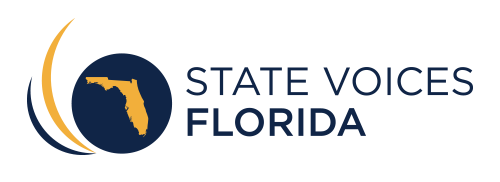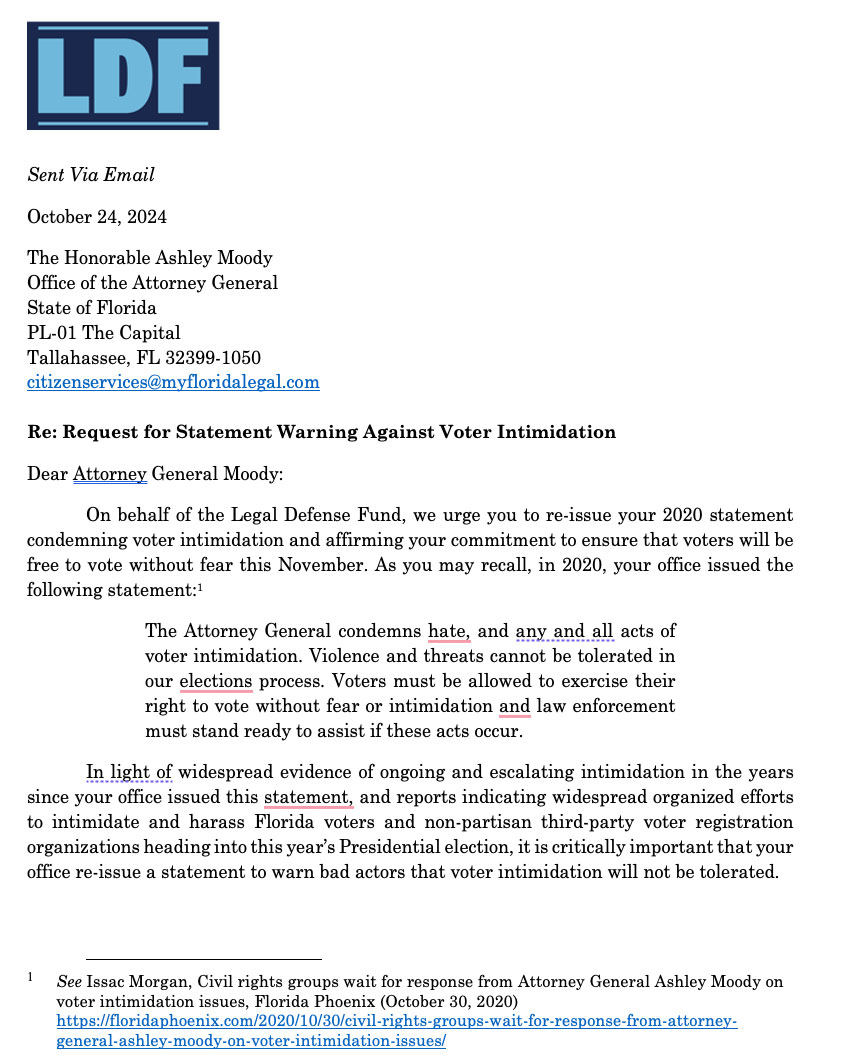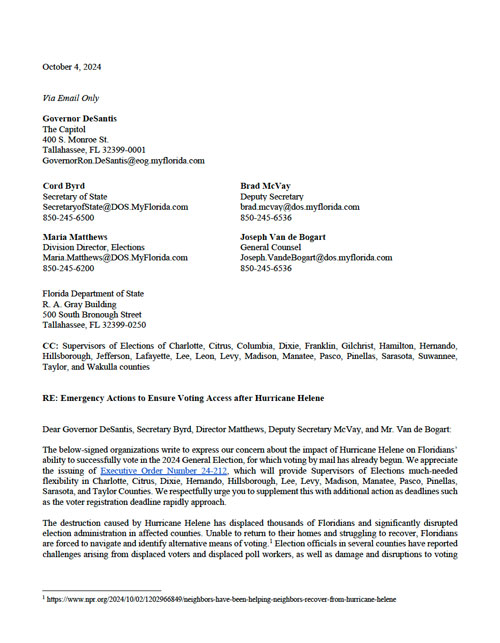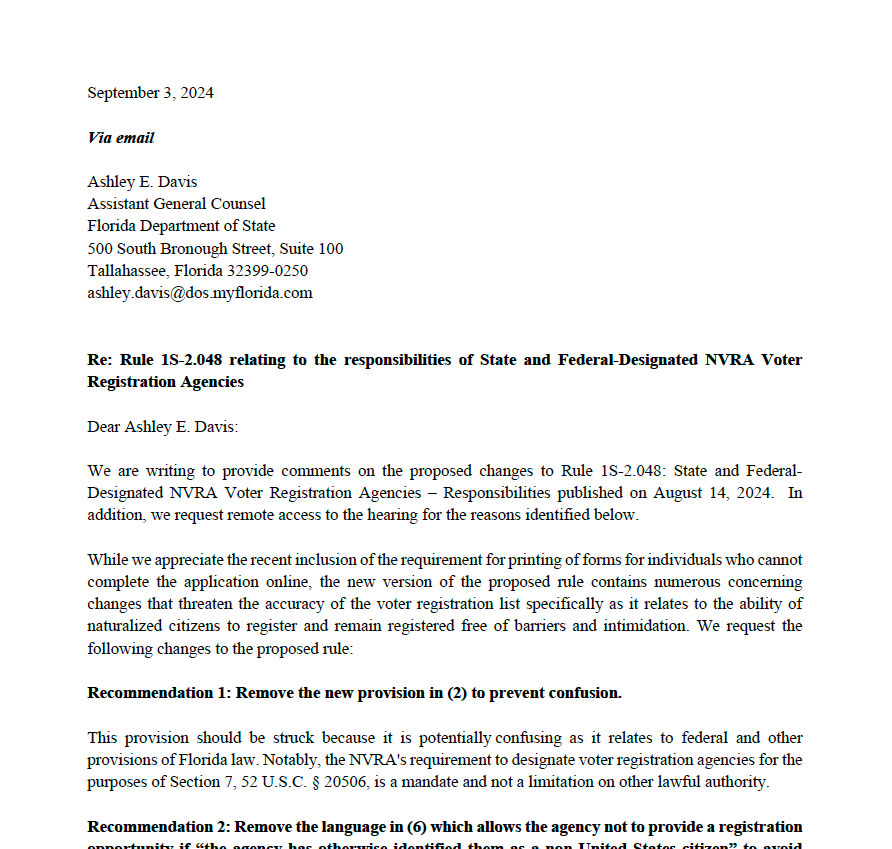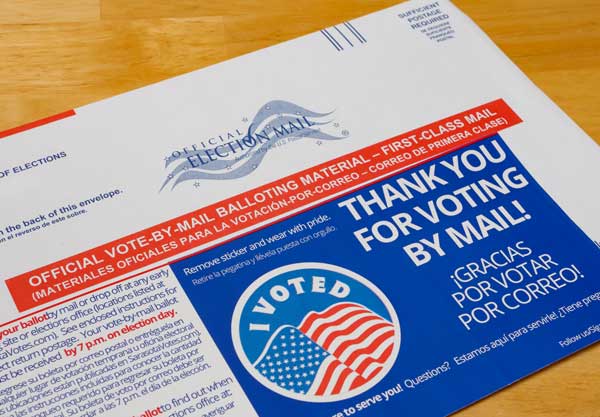
January 15, 2025
Dear Clerk, Manager or Administrator,
As voting rights organizations, we truly appreciate the work the Supervisors of Elections across the state of Florida are doing to ensure voters have access to important information and are election-ready. However, this daunting task requires other election administrators, county officers, and municipal officers to do their part as well, especially as we approach special and municipal elections that may not be on voters’ radars, with the added caveat that many voters may also be unaware of the need to submit a new vote-by-mail request if that is their preferred voting method.
Dear President Biden,
On behalf of the 128 undersigned civil liberties, civil and human rights, faith-based, academic, and social justice organizations, we write to urge you to use your constitutionally provided power to commute the sentences of all individuals on federal death row. We commend your administration’s actions to repudiate capital punishment, including imposing a moratorium on executions for those sentenced to death, and for publicly calling for an end to the use of the death penalty during your 2020 campaign.1 In the face of a second Trump administration, more is necessary.
Forty people are currently on federal death row. Over half of those individuals are non-white, including 38% who are Black, despite Black adults representing 11.7% of the population.2 The federal death penalty is not immune from the hallmark irreparable failures of the death penalty at the state level.3 Indeed, the nation bore witness to thirteen executions in the final seven months of the first Trump administration, all of which were marred with devastating issues endemic to capital punishment like racial bias, ineffective legal assistance, unreliable forensic evidence, and defendants executed who had substantial intellectual disabilities and severe mental health conditions.4
The below-signed organizations write to express our concern about the impact of Hurricane Helene on Floridians’ ability to successfully vote in the 2024 General Election, for which voting by mail has already begun. We appreciate the issuing of Executive Order Number 24-212, which will provide Supervisors of Elections much-needed flexibility in Charlotte, Citrus, Dixie, Hernando, Hillsborough, Lee, Levy, Madison, Manatee, Pasco, Pinellas, Sarasota, and Taylor Counties. We respectfully urge you to supplement this with additional action as deadlines such as the voter registration deadline rapidly approach.
The destruction caused by Hurricane Helene has displaced thousands of Floridians and significantly disrupted election administration in affected counties. Unable to return to their homes and struggling to recover, Floridians are forced to navigate and identify alternative means of voting.1 Election officials in several counties have reported challenges arising from displaced voters and displaced poll workers, as well as damage and disruptions to voting sites and other election infrastructure.2 Supervisors of Elections need extended time and flexibility to solve for the widespread damage and displacement as a result of Hurricane Helene.3
In light of the above, we respectfully request that the Governor and Secretary of State take the following emergency actions to ensure voting access for all Floridians.
The below-signed organizations write to express our concern about the impact of Hurricane Helene on Floridians’ ability to successfully vote in the 2024 General Election, for which voting by mail has already begun. We appreciate the issuing of Executive Order Number 24-212, which will provide Supervisors of Elections much-needed flexibility in Charlotte, Citrus, Dixie, Hernando, Hillsborough, Lee, Levy, Madison, Manatee, Pasco, Pinellas, Sarasota, and Taylor Counties. We respectfully urge you to supplement this with additional action as deadlines such as the voter registration deadline rapidly approach.
The destruction caused by Hurricane Helene has displaced thousands of Floridians and significantly disrupted election administration in affected counties. Unable to return to their homes and struggling to recover, Floridians are forced to navigate and identify alternative means of voting.1 Election officials in several counties have reported challenges arising from displaced voters and displaced poll workers, as well as damage and disruptions to voting sites and other election infrastructure.2 Supervisors of Elections need extended time and flexibility to solve for the widespread damage and displacement as a result of Hurricane Helene.3
In light of the above, we respectfully request that the Governor and Secretary of State take the following emergency actions to ensure voting access for all Floridians.
Dear Ashley E. Davis:
We are writing to provide comments on the proposed changes to Rule 1S-2.048: State and Federal- Designated NVRA Voter Registration Agencies – Responsibilities published on August 14, 2024. In addition, we request remote access to the hearing for the reasons identified below.
While we appreciate the recent inclusion of the requirement for printing of forms for individuals who cannot complete the application online, the new version of the proposed rule contains numerous concerning changes that threaten the accuracy of the voter registration list specifically as it relates to the ability of naturalized citizens to register and remain registered free of barriers and intimidation. We request the following changes to the proposed rule:
On Wednesday, April 17, 2024, a new uniform vote-by-mail request form (DS-DE 160) for the state of Florida went into effect, and the state has made it available in English and Spanish. However, we would like to call attention to the need for broader resources to assist voters whose primary language is not English during the electoral process; in particular, we would like to call attention to the needs of Haitian voters, which in Polk County, we have estimated the number to be at least 4,197 voters, based on the latest Target Smart1 data by way of Civis Analytics.2
Currently, only the county of Miami-Dade has a local ordinance that requires electoral materials to be available in Haitian Creole. As such, the county has made available a new vote-by-mail request form in the language. Broward County has also voluntarily adopted a similar form. Given the growth of Haitian voters in your county, we kindly ask that your office accept vote-by-mail requests that are made using the Haitian Creole translated version of the form, make printed forms available at the SOE main and branch offices, and establish procedures to ensure voters know how to obtain the form and that the requests are processed.
While dis- and misinformation about our elections have circulated for many years, the 2020 election acted as the impetus for sowing doubt regarding the safety and security of our voting systems, particularly in relation to falsehoods perpetuated around the safety and reliability of vote-by-mail ballots. All election disinformation is dangerous; according to POLITICO, “disinformation alone has now become the single biggest threat to electoral integrity in many countries around the world, meaning that what election authorities have traditionally seen as their biggest obligation — organizing technically competent free and fair elections — is no longer enough.”1
Our organizations want to stress the critical role you play in combating dis- and misinformation. Your role requires you to avoid the amplification of false claims and share accurate and reliable information from trusted sources such as the Supervisor of Elections Office about the election process through all available means.
We want to reaffirm that there are systems in place that guarantee the safety and accuracy of our elections. These include:
All Voting is Local Action and the below-signed organizations are deeply concerned about the attached email sent by Director Maria Mathews to supervisors of elections on May 15, 2024, directing them to conduct voter registration list maintenance under Sections 98.045(2), 98.065, or 98.075(6)-(7) of Florida Statutes, using data produced by a private citizen affiliated with EagleAI. Such action would likely violate state and possibly federal law and improperly jeopardize the voting status of thousands of Floridians.
According to the email sent by Director Matthews, a concerned citizen shared a list of approximately 10,000 Florida voters who they asserted should be examined for list maintenance. The email’s sender said the list was generated with the assistance of EagleAI. EagleAI is a list-matching database that relies exclusively on publicly available information, all of which is insufficient to determine whether a voter is eligible to vote at their registration address. According to Georgia Elections Director Blake Evans, “EagleAI draws inaccurate conclusions and then presents them as if they are evidence of wrongdoing.”1
